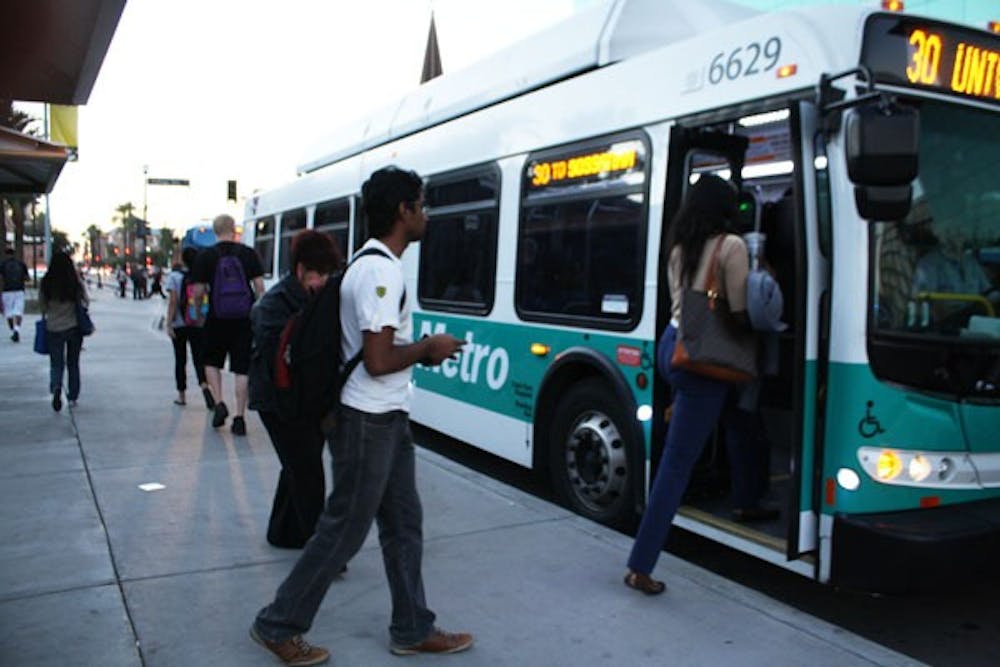 The City of Tempe is looking to save money by contracting with Valley Metro to run its bus system, which includes the Orbit and Flash buses. (Photo by Jessie Wardarski)
The City of Tempe is looking to save money by contracting with Valley Metro to run its bus system, which includes the Orbit and Flash buses. (Photo by Jessie Wardarski)The city of Tempe and Valley Metro are planning an intergovernmental agreement to transfer bus-operating responsibilities from the city to the Regional Public Transportation Authority as a cost-cutting measure by Tempe officials.
The move to create a unified transit contract allowing the RPTA to run the city’s buses and associated facilities in Tempe and Mesa will go before Valley Metro’s board for approval Dec. 13.
The Tempe City Council and the Valley Metro board will vote on the intergovernmental agreement in early 2013.
Valley Metro spokeswoman Susan Tierney said Tempe would hand its operating responsibilities over to Valley Metro by July 1 if the contract is approved.
Tempe operates 19 bus routes throughout the city, which includes the Express, FLASH and Orbit lines and several local routes.
Valley Metro operates 16 percent of Tempe’s bus lines, including bus routes on Broadway Road and University Drive.
The move is smart for both the city of Tempe and the regional transit system because of the cost savings, she said.
“We are streamlining the service to enhance the service,” she said. “We are hoping this move saves money so there could be possible expansion in the future.”
Like many cities throughout the country, Tempe has not been spared from rough economic times.
Tempe transit spokeswoman Sue Taaffe said the city closed a three-year budgetary shortfall of $15 million dollars in July and is now looking to save even more money by giving up city-funded bus services.
“We are looking to save the city $500,000 to $600,000 in transit costs annually with this move,” Taaffe said.
The change is meant to preserve existing bus service in Tempe and other cities served by Tempe-owned buses, as budget gaps created by lagging sales tax revenues drain local and regional transit coffers.
The plan is expected to have an annual cost savings of $800,000 to $1 million a year for the regional transit system.
City transit officials plan to scrutinize Valley Metro’s customer service standards over the proposed three-year operation contract to ensure public satisfaction, Taaffe said.
“It will be closely monitored in the first two-year performance period,” she said. “There are always complaints about service no matter who runs the service, but we will be making sure Valley Metro manages the system well.”
Tempe was the first city in the Valley to pass a tax specifically for transit services in 1996. The city will still have a strong presence in the new transit relationship because of funding responsibility.
Transit officials from both sides said the public would not see a difference in service.
“We hope to see enhancements in service: friendlier drives, better bus times and possibly more routes,” Tierney said.
Computer science senior James Bramwell said Tempe’s Flash bus is unreliable.
“The service can be inconsistent when it comes to keeping on schedule,” Bramwell said. “I’ve tried to time the bus to the times on the schedule, and they are usually off.”
ASU students and faculty should not notice any changes to bus routes serving the University’s or Parking and Transit Services’ bus passes, including the U-PASS and Platinum University transit passes, said Sarah Mason, the department’s spokeswoman.
“We will continue to offer all services to the ASU community as before,” Mason said. “ASU PTS will not be affected because we are all separate entities.”
Reach the reporter at rvalcho@asu.edu or follow him on Twitter at @rvalcho.




